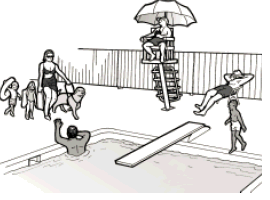5. Policies, Practices, and Procedures.
Towns must make reasonable modifications to policies, practices, and procedures to avoid discrimination against individuals with disabilities. While this requirement applies to all policies, practices, and procedures of the town, the town does not have to make modifications that would result in a fundamental alteration in the program, service, or activity or result in a direct threat to the health or safety of others. A direct threat is a significant risk that cannot be eliminated or reduced to an acceptable level by the town’s modification of its policies, practices, or procedures, or by the provision of auxiliary aids or services. The public entity’s determination that a person poses a direct threat to the health or safety of others may not be based on generalizations or stereotypes about the effects of a particular disability (see The ADA Title II Technical Assistance Manual).
The self-evaluation typically includes a review of polices, practices, and procedures (see page 10, Processes for Complying with the ADA). Periodic review after the self-evaluation may be done to maintain compliance with the ADA. A town can choose how it wants to conduct a review of policies and practices that govern the administration of the town’s programs, activities, and services. Towns that have already done a self-evaluation do not have to do another one.
Review of policies, practices, and procedures also applies to telephone emergency services, such as 9‒1‒1, where policies must ensure direct access to individuals who use TTY’s and computer modems.

A mother with her service animal leads her children to the town pool. Policies and procedures that restrict or prohibit service animals may violate the ADA.
Example
A town pool requires that adults provide photo identification to verify residency before using the pool or participating in pool programs. During review of town policies, practices, and procedures, the town determines that the pool identification policy, which requires that a driver’s license with a photo be presented to gain admission, may discriminate against people with disabilities who may not have a driver’s license. The town changes its policy to permit other forms of identification to verify residency.

User Comments/Questions
Add Comment/Question